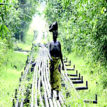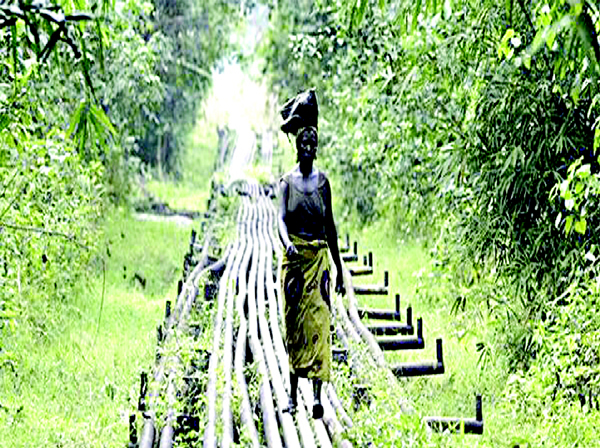Niger Delta region in a season of threats

By Jerome-Mario Utomi
JUST like history which has a way of repeating itself, the sudden wave of ultimatum issued to the Federal Government in a space of one week by two oil-producing communities in Delta State, as well as another by two Niger Delta region agitators, should be a source of worry to all.
These communities are: the Omadino Federated Communities, an umbrella body for Itsekiri communities in Delta State; and the Gbaramatu Kingdom, a major contributor to the economy of the nation and one of the prominent kingdoms among the Ijaw people in the Niger Delta, located in Warri South West Local Government Area of Delta State, Nigeria.
The two groups of agitators include the 13 Niger Delta militant groups, former beneficiaries of the Federal Government’s amnesty programme, organised under the aegis of the Coalition of Niger Delta Agitators, CNDA, and Niger Delta ex-militants, under the auspices of the 21st Century Youths of the Niger Delta and Agitators with Conscience, 21st CYNDAC.
The reason for the nation to feel worried is simple. If such threat is allowed to grow, it will again portray us as a nation that has not learned any useful lesson from history, mark the commencement of another vicious circle of chaos, damage the nation’s fragile economy that is crude oil- dependent and fundamentally sweep away President Muhammadu Buhari’s recent claim that the Federal Government has restored peace in the Niger Delta region through sustained engagement of youths, opinion leaders and other stakeholders.
A peep into their demands reveal that Gbaramatu Kingdom wants President Buhari to address the marginalisation meted out to them by the oil companies. Among other demands, they also seek an immediate halt on the current process of bids for 57 marginal fields and coming up with new modalities, where competent companies owned by Gbaramatu indigenes will be given right of first refusal. This demand, however, comes with a threat to shutdown petroleum operations in their communities in the next 10 days (out which six days has been spent), if the development is not addressed.
On their part, the Omadino Federated Communities, an umbrella body for Itsekiri communities in a simialr petition dated Tuesday, June 30, signed by Roland Oti Yomere, Chief Priest of Omadino and spokesman for the Federated Communities, and addressed to President Buhari, accused the present administration of gross marginalisation of its people. They want the President to address their ten-point demand as failure to comply within nine days will lead to a shutdown of crude oil production activities in the locality.
At about the same time, the 13 Niger Delta militant groups, in a joint statement signed by their leaders and made available to newsmen in Uyo on Wednesday, July 1, 2020, threatened to withdraw from the ceasefire agreement and resume hostilities in the region because of President Buhari’s continued refusal to address the thorny issues of marginalisation of the Niger Delta in terms of appointments in the oil and gas sector particularly the replacement of the group managing director of the Nigerian National Petroleum Corporation, NNPC, with a national from the region.
In a similar style, CYNDAC on Saturday, July 5, frowned at the Federal Government’s delay in reaching an agreement with the Pan-Niger Delta Elders Forum, PANDEF, for a critical and holistic look towards a peaceful resolution of the myriads of problems facing the region, and again warned of renewed hostilities in the region, if the Federal Government fails to implement the 16-point agenda as submitted by PANDEF few years ago.
Conversely, before believing the above position by Mr. President that there was peace in the region, a statement by the spokesperson of Gbaramatu Kingdom for the Traditional Council of Chiefs, Chief Godspower Gbenekama JP, perhaps brings more tragic recognition of reality that took place in the kingdom.
It also reveals how clear it has become that the Federal Government is doing far more than devastation of the hopes of the people of the region. The kingdom, the statement noted, is constrained to write to the president on issues that have previously been made known to the government via various forms and at different times to the Vice President, Prof. Yemi Osinbajo, especially during his visit to the Kingdom in January 2017.
READ ALSO: Niger Delta can’t breathe due to National Assembly’s stranglehold — UNDEDSS
It recalled that Gbaramatu Kingdom has kept to her end of the social contract that enabled the end of the previous dangerous era of agitation that was prevalent in Gbaramatu Kingdom, and has led to a situation where “Gbaramatu is one of the safest places to live, do business and visit in Nigeria, despite government’s refusal to treat them fairly.
It further lamented that the Omadinor-Excravos road project which was started, and would have led to greater peaceful coexistence and dramatically improved economic and more cordial relations between the Ijaws and Itsekiris of Warri South and Warri South-West neighbouring local governments has been put on indefinite hold under this administration.
While submitting that nowhere is this marginalisation more glaring than in the abrupt abandonment of the multi-billion dollar Export Processing Zone, EPZ, Gas Revolution Industrial Park, Ogidigben and Deep Sea Port Project, Gbaramatu Project that would have created thousands of direct and indirect jobs.
Certainly, a striking tragedy deepened by the awareness that it was avoidable particularly when one remembers that this threat is neither by accident nor the first half of a reoccurring cycle but rather the beginning of something new. And, looking at the recent declaration by the Social and Economic Justice Advocacy, SEJA, a Lagos based non-governmental, that the Nigerian state has not treated the Niger Delta well, it is obvious that the protests by the communities is justified.
It noted the African Commission’s well-considered decision in the celebrated SERAC vs. Nigeria’s case, finding the Federal Republic of Nigeria in gross violations of 2, 4, 14, 16, 18(1),21 and 24 of the African Charter on Human and Peoples’ Rights, ACHPR, and therefore recommended a total clean up of the polluted Ogoni and other adjoining communities in addition to taking preventive remedial and compensatory measures to improve economic and social outcomes for the Ogoni community.
SEJA in a statement was particularly not happy that all available indicator points to the fact that the Federal Government environmental legacy project which is the clean up of Ogoni is failing and lagging behind because Hydrocarbon Pollution Remediation Project, HYPREP, handling the Ogoni cleanup lacks the capacity to conduct a proper cleanup.
As this debate rages, the greatest concern is that instead of the Federal Government seeking real victory via dialogue and not through conquest, chances are that they may go for another military drill as used in past. Government forgets that as a nation, we have in the past travelled to the southeastern part to watch the python dance, and witnessed the ugly crocodile smile in the south-south.
Equally, we have watched the recent episode of these drama series codenamed: “Operation Octopus grip” as declared by the Nigerian Navy in the Niger Delta region, an note that all these ‘dances, smiles and grips’ share but a common outcome called chaos. They have a way of leaving in their trails sorrows, tears and blood.
Despite the fact that those of us who believe in the unity of Nigeria may not agree with campaign of any group or ethnic nationality to dismember Nigeria, the truth must be told to the effect that the whole gamut of restiveness of youths, whether in the South east, South-South, North or Southwest, and resurgence demand for the dissolution of Nigeria stems from mindless exclusion, injustice and economic deprivation.
The template to solve these problems is already there: the Report of the 2014 National Conference. The holistic implementation of that report is germane to the survival of the Nigeria which is right now in its most fragile state since the end of the civil war.
I believe that the protests in the Niger Delta would instantly fizzle away and their cause dies naturally, if Nigeria is restructured to ensure more inclusiveness. But agitations for the death of Nigeria cannot go away when nepotism and sectionalism continue to be evident in the manner of political patronage and distribution of our common patrimony as currently obtained.
Finally, the Niger Deltans, especially its youths, should allow sanity prevail over emotion. But as noted in a previous intervention, I hold the opinion that ‘the destiny of the ship is not in the harbour but in sailing the high sea” and so shall our collective responsibility be, not to destroy this great nation but join hands to nurture and sustain it.
If we are able to manage this situation and other social menaces effectively and navigate out of dangers of disintegration, it will once again, announce the arrival of a brand new great nation where peace and love shall reign supreme. But, then, no nation enjoys durable peace without justice, stability, fairness and equity!
The post Niger Delta region in a season of threats appeared first on Vanguard News.

No comments: